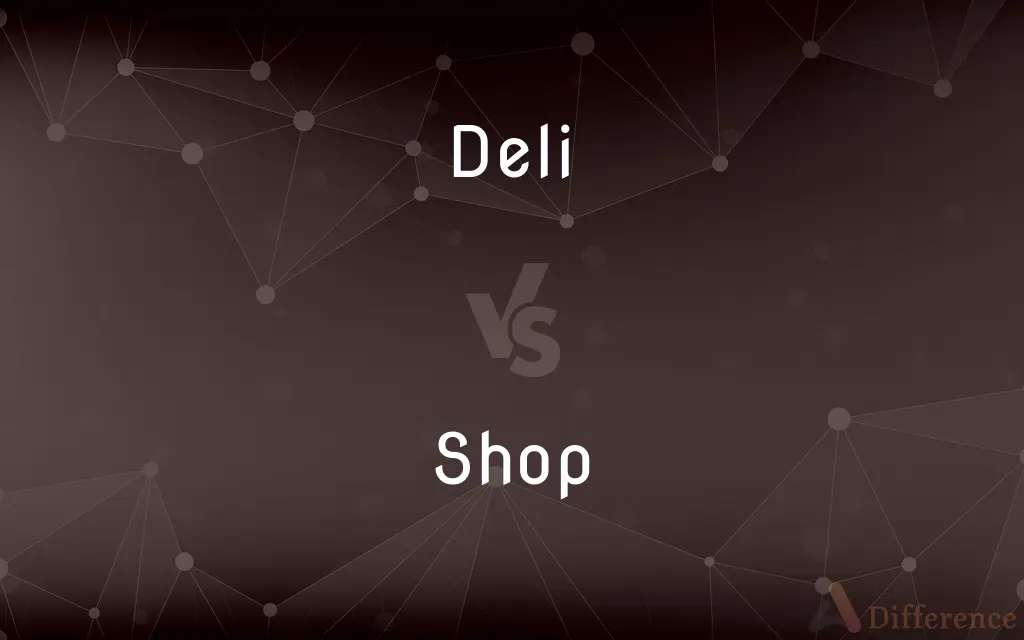Deli vs. Shop — What's the Difference?
By Maham Liaqat & Urooj Arif — Updated on May 8, 2024
A deli is a specialized store focusing on cold cuts, cheeses, and prepared foods, while a shop is a general term for any small retail establishment selling various items.

Difference Between Deli and Shop
Table of Contents
ADVERTISEMENT
Key Differences
A deli, short for delicatessen, specifically caters to selling fine or foreign prepared foods such as meats, cheeses, and a variety of salads, often with options for made-to-order sandwiches. On the other hand, a shop is a broad term that can refer to any retail establishment, from clothing stores to hardware stores, where goods are sold to the public.
While a deli offers a specific selection primarily focused on food, particularly for immediate consumption or light preparation at home, a shop might not necessarily deal with food products and can include a vast range of retail items. Shops can be specialized, like bookshops or flower shops, or more general, like convenience stores.
In terms of service, delis often feature a counter where customers can order food to be sliced or prepared to their specifications, emphasizing a personalized service experience. Conversely, shops may or may not offer such personalized services, depending on their nature and the products they sell.
The atmosphere and layout of a deli are typically designed around the display and sale of food products, with features like refrigerated counters and perhaps a few dine-in tables. Shops, however, have more varied layouts tailored to their specific products, ranging from spacious clothing boutiques to compact electronic stalls.
The term "deli" has a more specific cultural connotation, often associated with European, particularly Jewish and Italian, culinary traditions. In contrast, "shop" is a more universally understood term without specific cultural connotations.
ADVERTISEMENT
Comparison Chart
Definition
A store specializing in fine, prepared foods, particularly meats and cheeses
A general term for any retail establishment
Specialization
Focused on food, especially ready-to-eat and to-go options
Can be specialized or general, ranging from food to clothing
Service
Often includes counter service with personalized food preparation
Service varies widely, generally less personalized
Layout
Designed around food display and service, may include seating areas
Layout varies widely depending on product range
Cultural Connotation
Often associated with European and Jewish culinary traditions
No specific cultural connotation, broadly used globally
Compare with Definitions
Deli
A store selling prepared foods and specialty ingredients.
The deli had an excellent selection of imported cheeses.
Shop
A general term for a small retail store.
She opened a small coffee shop in the downtown area.
Deli
Frequently associated with specific ethnic cuisines, especially Jewish or Italian.
The neighborhood deli is known for its authentic Italian sausages.
Shop
Sometimes used to describe a workshop or place where manual work is done.
The carpenter spent hours in his shop.
Deli
Often focuses on meats and cold cuts, served over the counter.
He ordered a pound of pastrami at the deli counter.
Shop
Can also imply an online presence, as in an e-commerce shop.
Their online shop offers a wider selection than their physical store.
Deli
Includes a service aspect, with food often prepared in view of the customers.
She watched as the deli worker sliced her turkey thinly.
Shop
Can specify the type of goods sold, like a bookshop or a flower shop.
He visited the bookshop to find the latest bestseller.
Deli
May provide sandwiches and salads made to order.
Their deli makes the best Reuben sandwiches.
Shop
Describes the physical location of a business selling goods.
The corner shop sells everything from snacks to stationery.
Deli
A delicatessen.
Shop
Also shoppe A small retail store or a specialty department in a large store.
Deli
(informal) A shop that sells cooked or prepared food ready for serving.
Delis usually offer a broader, fresher menu than fast food chains.
Shop
An atelier; a studio.
Deli
(informal) Food sold at a delicatessen.
Shop
A place for manufacturing or repairing goods or machinery.
Deli
A shop selling delicatessen (as salads or cooked meats)
Shop
A commercial or industrial establishment
A printing shop.
Shop
A business establishment; an office or a center of activity.
Shop
A home workshop.
Shop
A schoolroom fitted with machinery and tools for instruction in industrial arts.
Shop
The industrial arts as a technical science or course of study.
Shop
To visit stores in search of merchandise or bargains.
Shop
To look for something with the intention of acquiring it.
Shop
To visit or buy from (a particular store).
Shop
An establishment that sells goods or services to the public; originally only a physical location, but now a virtual establishment as well.
Shop
A place where things are manufactured or crafted; a workshop.
Shop
A large garage where vehicle mechanics work.
Shop
Workplace; office. Used mainly in expressions such as shop talk, closed shop and shop floor.
Shop
Discussion of business or professional affairs.
Shop
A variety of classes taught in junior or senior high school that teach vocational skill.
Shop
An establishment where a barber or beautician works.
A barber shop
Shop
An act of shopping, especially routine shopping for food and other domestic supplies.
This is where I do my weekly shop.
Shop
(intransitive) To visit stores or shops to browse or explore merchandise, especially with the intention of buying such merchandise.
I went shopping early before the Christmas rush.
He’s shopping for clothes.
Shop
(transitive) To purchase products from (a range or catalogue, etc.).
Shop our new arrivals.
Shop
To report the criminal activities or whereabouts of someone to an authority.
He shopped his mates in to the police.
Shop
To imprison.
Shop
To photoshop; to digitally edit a picture or photograph.
Shop
(dated) Used to attract the services of a shop assistant
Shop
A building or an apartment in which goods, wares, drugs, etc., are sold by retail.
From shop to shopWandering, and littering with unfolded silksThe polished counter.
Shop
A building in which mechanics or artisans work; as, a shoe shop; a car shop.
A tailor called me in his shop.
Shop
A person's occupation, business, profession, or the like, as a subject of attention, interest, conversation, etc.; - sometimes in deprecation or disapproval; as, to talk shop at a party. Also used attributively, as in shop talk.
Shop
A place where any industry is carried on; as, a chemist's shop;
Shop
Any place of resort, as one's house, a restaurant, etc.
Shop
The group of workers and the activities controlled by an administrator; as, to have five people in one's shop.
Shop
To visit shops for the purpose of purchasing goods.
He was engaged with his mother and some ladies to go shopping.
Shop
A mercantile establishment for the retail sale of goods or services;
He bought it at a shop on Cape Cod
Shop
Small workplace where handcrafts or manufacturing are done
Shop
A course of instruction in a trade (as carpentry or electricity);
I built a birdhouse in shop
Shop
Do one's shopping;
She goes shopping every Friday
Shop
Do one's shopping at; do business with; be a customer or client of
Shop
Shop around; not necessarily buying;
I don't need help, I'm just browsing
Shop
Give away information about somebody;
He told on his classmate who had cheated on the exam
Common Curiosities
What are common types of shops?
Common types of shops include grocery stores, clothing stores, bookshops, and convenience stores.
Is there a cultural significance to delis?
Delis often have a cultural significance, particularly within European, Jewish, and Italian communities, known for specific foods and traditions.
How does the service in a deli differ from that in a general shop?
Service in a deli often involves direct interaction at the counter where foods are prepared or cut to order, unlike in many general shops where goods are pre-packaged.
Can shops be found online?
Yes, many shops have online counterparts where they sell their goods through e-commerce platforms.
What is the main difference between a deli and a food shop?
The main difference is that a deli specifically offers prepared and specialty foods, often with a focus on meats, while a food shop may sell a broader range of grocery items.
What kind of layout is typical in a shop?
The layout in a shop varies widely but is generally designed to maximize product display and customer flow.
What is the role of customer interaction in a deli?
Customer interaction in a deli is crucial as it involves choosing specific cuts, weights, and types of food directly with the service staff.
What typically characterizes a deli?
A deli typically features a selection of prepared foods, especially meats and cheeses, and offers personalized counter service.
Can a deli be considered a shop?
Yes, a deli can be considered a type of shop, specifically focused on food products.
Are delis usually more expensive than regular shops?
Delis can be more expensive due to the specialty and prepared foods they offer, which often come from higher-quality sources.
What are the key elements of customer service in a shop?
Key elements include product knowledge, helpfulness, efficiency, and sometimes personalized advice, depending on the type of shop.
How important is location for a shop?
Location is very important for a shop as it affects foot traffic, customer convenience, and overall sales performance.
Why might someone choose a deli over a supermarket?
Someone might choose a deli over a supermarket for specialty products, freshly prepared foods, and a more personalized shopping experience.
How do delis cater to specific dietary needs?
Delis cater to specific dietary needs by offering a variety of products, including gluten-free, vegan, or kosher options, often with the possibility to inquire about ingredients and preparation.
What makes a deli distinctive from other food-related shops?
What distinguishes a deli is its focus on high-quality, ready-to-eat foods, personalized service, and often a cultural link to specific culinary traditions.
Share Your Discovery

Previous Comparison
Reunition vs. Reunion
Next Comparison
Somnolent vs. StuporAuthor Spotlight
Written by
Maham LiaqatCo-written by
Urooj ArifUrooj is a skilled content writer at Ask Difference, known for her exceptional ability to simplify complex topics into engaging and informative content. With a passion for research and a flair for clear, concise writing, she consistently delivers articles that resonate with our diverse audience.
















































